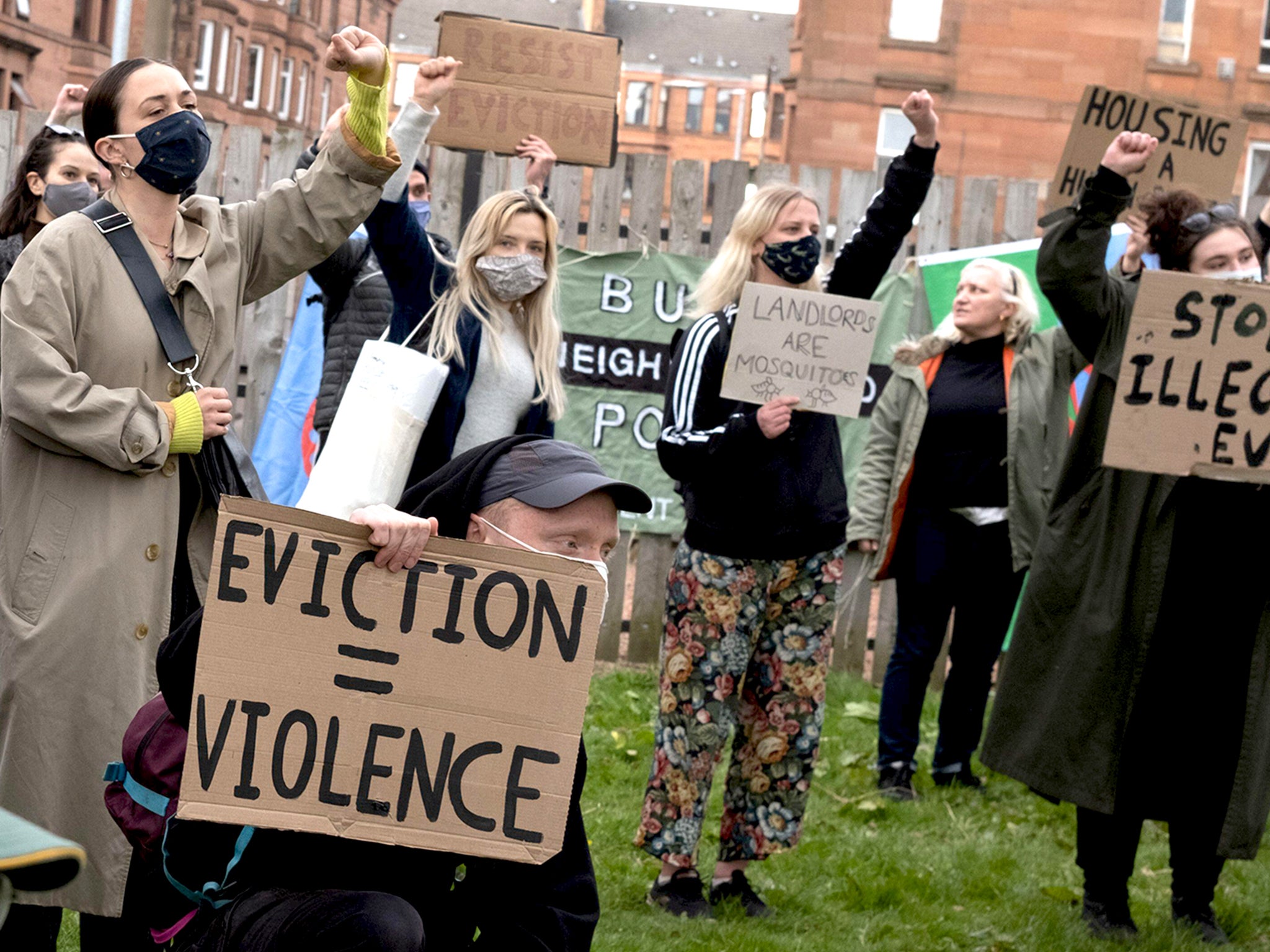The fight to end illegal evictions
Tenants are more likely than ever to be turfed out of their homes without reason by their landlords, according to rights groups. But, writes Hannah Fearn, is there finally some light at the end of the tunnel?


During the early months of the first Covid-19 lockdown in 2020, as we waited anxiously inside our homes for health experts to understand more about the virus, for one group of people there was a pause – a respite. Along with much of the economy, the housing market was temporarily closed; landlords were blocked from pursuing evictions, and for the first time, if only for a moment, tenants could relax and call a home their own.
But the moment turned out to be bittersweet. Whether it is down to a backlash against lockdown regulations, or the simple knowledge among landlords that they can get away with it, tenants are now more likely than ever to be turfed out of their homes illegally.
According to tenants’ rights advisory group Safer Renting, which has been charting the rise of illegal evictions, a total of 7,778 households were illegally removed from their properties in 2021, up from just under 6,930 in 2020. Given the difficulty of obtaining accurate data, each calculation is likely to be a gross underestimate: the figures don’t take into account individuals who didn’t seek support, or who did not declare their circumstances to any council, charity or agency.
The consequences of sudden eviction can be devastating, and the emotional fallout can last a lifetime, as a report on the figures from Safer Renting notes: “The loss of home with minimal notice and with possessions stolen or left out on the street is a dreadful violation … Even where clients are rehoused, it may be difficult for them to feel safe again.” The report prompted Labour MP Karen Buck to describe the data as “not just numbers – every one is a life ruined and traumatised”.
The figures do not come as a surprise to Ben Reeve-Lewis, founder of Safer Renting. He says that improper, and even aggressive, evictions are becoming more commonplace because there’s no deterrent in place to prevent landlords from behaving badly. Despite thousands of cases of illegal eviction across the country in 2020, only 23 prosecutions were attempted – and only 12 of those resulted in successful convictions. Even in that handful of cases, the punishment – often a fine of just £100 – can be written off as a business loss.
The true number of tenants who are unfairly forced out of their homes is even higher; many who are suddenly asked to leave without due legal process being followed by their landlord choose to do so because they do not realise they have the right to stay. But to qualify as an illegal eviction under the Protection from Eviction Act 1977, some element of force must be used. That could include changing the locks, removing water and energy supplies, making verbal or physical threats, or even direct violence.

Eleanor Solomon, housing solicitor at Anthony Gold, says her firm has registered more enquiries about illegal evictions since the start of the pandemic. She says this could be down to the backlog in courts, which has rendered them unable to support landlords who want to remove their tenants through the correct channels. Cases that would previously take three months to resolve are now lasting a year or longer. “There’s a huge backlog in lawful evictions, and landlords are becoming frustrated and resorting to illegal measures,” she explains.
It is at this point that the police should step in – but, says Solomon, that’s not what happens. Tenants who report being treated illegally by landlords are routinely told that illegal eviction is a civil matter, not a job for the police. If officers do attend the property, they may end up arresting the tenant instead, on spurious grounds such as breach of the peace.
“The police have been entirely uninterested,” Solomon says. “They won’t acknowledge it is a criminal offence. Every single time, they say this is a civil matter – and I’ve no doubt that has got worse since police cutbacks. The police can’t be expected to be experts in civil law, they shouldn’t be advising anyone about that, but they should know that it’s an offence to unlawfully evict somebody.”
She adds: “In many cases the tenant will be very upset, and they’ll get arrested rather than the landlord – that’s very common – or the landlord will make a counter-allegation against the tenant. It scares the police off from doing anything.”
Ruth Erhlich, policy manager at the housing charity Shelter, has witnessed the same phenomenon. “If a tenant finds themselves locked out, they need immediate assistance. There’s a huge job there to make sure that the police are on the renter’s side. If the police were better trained, landlords might think twice about evicting people illegally,” she says.

Following years of underfunding, many councils no longer employ a team of tenant relations officers – Reeve-Lewis established his Safer Renting consultancy to plug that gap when he was made redundant from his own local authority role – so tenants have few places to go for support. Most don’t know, for example, that landlords should always have a bailiff with them at the point of eviction.
New powers were granted to councils in 2004 to enforce better standards in private rented housing, but the lack of funding available to local authorities means these have proved mostly toothless. And while the law allows councils to access information about property ownership via council tax records for the purpose of investigating housing safety, they are not allowed to do the same when helping to investigate a potentially illegal eviction.
The campaign group Generation Rent has tried to break this impasse by educating police about their responsibilities. They have attempted to reach forces across the country through local police and crime commissioners. Dan Wilson Craw, deputy director of Generation Rent, admits that some areas have been more receptive than others to considering simple changes that would support renters – including the need for call handlers, and officers on the beat, to be able to recognise what an illegal eviction process looks like.
For now, though, the repeated refusal of police to get involved means that only the most violent cases of illegal eviction ever make it to court – and when they do, there is a high bar of evidence to be met. Cases that reach the magistrates’ court only have a 50 per cent chance of success – once again because the authorities involved in prosecution simply don’t understand the severity of eviction.
“Magistrates don’t consider the crime a serious one,” Erhlich says. “People have been illegally kicked out, they have lost their home, and the landlord has committed a crime. But there is a cultural thing of seeing properties as the landlord’s asset, even though, if you choose to have a property and rent it out, then that’s someone else’s home; they don’t have anywhere else to go,” she says.
The disproportionately lenient sentences handed out for these crimes demonstrate a lack of understanding among often older, wealthier magistrates.
The private rented sector is larger than ever, and that’s the whole problem
Giles Peaker, a solicitor specialising in housing issues and author of the Nearly Legal blog, describes sentencing procedures as “atrocious”. The law allows an unlimited fine to be imposed on landlords who evict illegally, but Peaker reports that most prosecutions only result in a small fine, or a short, suspended sentence. “This is pretty consistent; it’s a cultural thing – it isn’t one court taking a particular view. It’s the same for most of them, wherever one of these [cases] comes up. [Magistrates] see it as a relatively low-order offence. They think, ‘Oh, the landlord could get them out anyway in a couple of months, so what’s the real harm?’”
Though this is anything but a victimless crime, the victims have no route to justice. With little advice and support for tenants, and the lack of legal aid available to fight a case, most simply give up. After the trauma of losing a home, they just want to move on with their lives. If they do choose to take on a civil case, solicitors say the chances of success are higher, as the claimant only has to demonstrate that they were unlawfully removed from a property “on the balance of probabilities”, rather than beyond all reasonable doubt.
But a civil conviction does not act as a deterrent to rogue landlords: there is no prosecution, no enforcement of bans on acting as a landlord, and the sum paid out may be minuscule in terms of the profit a rogue operator could be generating. It might give the wronged tenant a handout, but it does nothing to change the culture of a rotten housing market. As Solomon observes: “Even if the civil case is published, I doubt many landlords are reading civil case law.”
Finally, however, a moment for change has arrived: after three attempts, the Renters’ Reform Bill will finally reach deliberation in this parliamentary session. It is a chance to change the culture of our housing market, which at present prioritises the rights of the landlord – the landowner, in feudal terms – over those of the tenant. The flagship clause of the bill is the removal of the right to issue Section 21 “no-fault” evictions, which allow a landlord to serve notice at any time without having to give a reason for their decision to evict. That is just one part of a much bigger cultural shift that is now long overdue.

Housing policy consultant Toby Lloyd, a fellow of research group Create Streets, has been lobbying for this change in the law for more than four years. He sees an opportunity to shift the “balance of negotiating power” in favour of renters. Tenants who know they have the legal right to stay in their home unless they breach their contract are more likely to make demands on landlords, such as requesting timely repairs.
Lloyd says the bill is “not just about changing what people can legally do, but changing the incentives and assumptions that drive behaviour on both sides. Landlords who know they can’t just evict tenants will have much more incentive to respond quickly [to their concerns]. Culture change is a complicated thing. Lots of factors affect it, but this is the one lever at the heart of it.”
As well saying good riddance to no-fault evictions, housing campaigners want to see other important changes contained in the bill to usher in that cultural shift. One is giving police a legal duty to cooperate and assist local authorities with investigations into illegal eviction, which would require them to take note of complaints and follow them up, and provide evidence when asked. And given that police resources are already stretched, handing legal responsibility for pursuing illegal evictions over to councils would also be sensible. Together, those two measures could increase prosecution rates.
The bill also provides an opportunity to professionalise the rental market, which Shelter’s Ruth Erhlich describes as “a bit of a Wild West”.
“You don’t need any qualification to be a landlord; that’s why we see so much poor practice,” she explains. “The private rented sector is larger than ever, and that’s the whole problem: it’s doubled in size in the last 20 years, and there’s nothing to compensate [for] the fact that you now have families with children [living in it].” She would like to see a register for private rented properties that would help tenants confirm that their landlord was following the rules, and would also provide a way for the government to contact all landlords to educate and remind them about their responsibilities as well as their rights. Others say that such a register should be compulsory, not voluntary.
The Renters’ Reform Bill comes at a time when there is a wider philosophical question to be asked about the power that tenants hold and their right to a home. Those closely involved in discussions with housing secretary Michael Gove and his team describe the attitude of officials as “attentive”.
If the bill is well designed, it will embolden tenants to hold their landlords to account – perhaps for the first time. That is the first step towards demolishing a culture that prevents wronged tenants who have faced the trauma of being illegally evicted from finding justice.






Join our commenting forum
Join thought-provoking conversations, follow other Independent readers and see their replies
Comments